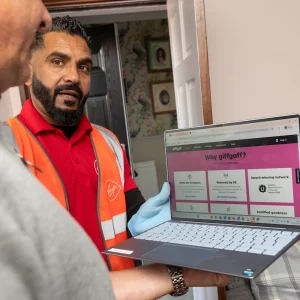Sponsored Links
UPD2 Rights Holders and UK ISPs Close in on Voluntary Website Blocking Code
Posted: 21st Jun, 2011 By: MarkJ

 Rights Holders and UK broadband providers appear to be rapidly closing in on the establishment of a new Voluntary Code of Practice for blocking any internet website that is deemed to "facilitate" internet copyright infringement.
Rights Holders and UK broadband providers appear to be rapidly closing in on the establishment of a new Voluntary Code of Practice for blocking any internet website that is deemed to "facilitate" internet copyright infringement. We reported earlier this year that Rights Holders initially wanted a list of the 100 worst BitTorrent indexes (e.g. The Pirate Bay) and cyber-locker (file storage) sites to be blocked (here). ISPs naturally raised a number of cost concerns and called for an impartial judge to choose which sites are restricted, thus shielding them from any legal action by site owners.
The government is understood to have held yet another closed industry round table event on 15th June last week. It was here that an alliance of Rights Holders presented their latest working paper - 'Addressing websites that are substantially focused on infringement'.
The paper suggests that a "council" and "expert body" be given the power to decide which websites are "substantially focused on infringement" and thus subjected to blocking. This would all be based upon evidence submitted by copyright owners.
The plan then envisages that the Applications Court would be responsible for issuing a permanent injunction, which would require UK ISPs to block a related domain (website). Naturally neither the Open Rights Group (ORG) nor Consumer Focus (CF) are pleased with the idea of two non-judicial bodies having such power and using the courts to rubber stamp their approvals.
Jim Killock, Executive Director of the Open Rights Group, said:
"It is unacceptable for trade groups and government to conduct policy in this way. Censorship proposals must be made and discussed in public. Many of us will oppose any censorship that impacts directly and widely on free expression. Governments would be wise to assess the strength of our arguments, rather than waiting for trade bodies to find their narrow, commercial arguments unravel once their proposals reach the light of day."
"It is unacceptable for trade groups and government to conduct policy in this way. Censorship proposals must be made and discussed in public. Many of us will oppose any censorship that impacts directly and widely on free expression. Governments would be wise to assess the strength of our arguments, rather than waiting for trade bodies to find their narrow, commercial arguments unravel once their proposals reach the light of day."
A Statement from Consumer Focus:
Consumer Focus has serious concerns about the proposal by copyright owner trade associations which would see ISPs block access to websites at a network level for all UK users. Our main concern is the fact that the trade associations do not identify the problem, ie the websites they think should be blocked. If the trade associations were to do this, it would be possible to evaluate whether website blocking in principle is necessary to reduce copyright infringement by consumers and increase the use of legal services.
Consumer Focus has serious concerns about the proposal by copyright owner trade associations which would see ISPs block access to websites at a network level for all UK users. Our main concern is the fact that the trade associations do not identify the problem, ie the websites they think should be blocked. If the trade associations were to do this, it would be possible to evaluate whether website blocking in principle is necessary to reduce copyright infringement by consumers and increase the use of legal services.
Consumer Focus, which was invited to attend the meeting, raises an interesting point about the need to see evidence. As we've seen with TalkTalk's block of legitimate websites (here) and discrimination against cyber-locker services like RapidShare (here), censorship can easily go too far.
Furthermore Consumer Focus doesn't believe that "website blocking should be seriously considered as an option" if copyright owners have not licensed their content to meet consumer demand through new digital platforms. Such an argument has never held much water with the government, although it's an interesting point to make.
Crucially the working paper has not proposed any costs for the scheme, which isn't likely to be cheap. The proposal also fails to identify which form of network level filtering would be used. That's important because some methods can impact broadband performance and may even cause ISP prices to rise, although one recent report suggests that they'd adopt the IWF's filter (here).
Still, perhaps the biggest problem of all is that ISP's have no real control to physically remove or block content that doesn't exist within their own network, at least not without stopping all http (web browsing) traffic. Any form of website blocking imposed by an ISP is merely an illusion (mask) and easily circumvented through a number of end-user solutions (e.g. VPN, Proxy Servers, DNS re-routing etc.).
UPDATE 23rd June 2011
The ISPA held a meeting about the recent event yesterday and has now been able to furnish us with the following statement to help clarify their position.
An ISPA Spokesperson:
"ISPA can confirm that a group of rightsholders proposed a voluntary web-blocking scheme to a meeting chaired by Communications Minister Ed Vaizey. However, we would like to emphasise that ISPreview’s statement that “Rights Holders and UK broadband providers appear to be rapidly closing in on the establishment of a new Voluntary Code of Practice for blocking” is not accurate.
While ISPA was not present at the particular meeting where the proposal was discussed we understand that the ISPs present at the meeting did not endorse the proposal. We also understand that several participants called for a wider involvement of consumer groups."
"ISPA can confirm that a group of rightsholders proposed a voluntary web-blocking scheme to a meeting chaired by Communications Minister Ed Vaizey. However, we would like to emphasise that ISPreview’s statement that “Rights Holders and UK broadband providers appear to be rapidly closing in on the establishment of a new Voluntary Code of Practice for blocking” is not accurate.
While ISPA was not present at the particular meeting where the proposal was discussed we understand that the ISPs present at the meeting did not endorse the proposal. We also understand that several participants called for a wider involvement of consumer groups."
UPDATE 21st July 2011
The Open Rights Group (ORG) has forced the government to release the minutes from its above meeting (here) via a Freedom of Information (FoI) request. The detail reveals that the system would be intended to target "a small number of structurally infringing sites", as opposed to "stray" infringement from sites such as YouTube.
Likewise ISPs would not forfeit their right to argue against the injunction, although the expectation is that they would hold their tongue. Crucially ISPs said that they should not be liable if customers find a way to circumvent the blocks. Generally speaking ISPs do support the principal, but most still have significant concerns (as highlighted above).
Search ISP News
Search ISP Listings
Search ISP Reviews
Latest UK ISP News







Cheap BIG ISPs for 100Mbps+
150,000+ Customers | View More ISPs
Cheapest ISPs for 100Mbps+
Modest Availability | View More ISPs
Latest UK ISP News
Helpful ISP Guides and Tips
Sponsored Links
The Top 15 Category Tags
- FTTP (6917)
- BT (3917)
- Politics (3120)
- Business (2822)
- Openreach (2703)
- Building Digital UK (2537)
- Mobile Broadband (2527)
- Statistics (2162)
- FTTC (2153)
- 4G (2132)
- Virgin Media (2066)
- Ofcom Regulation (1802)
- 5G (1782)
- Fibre Optic (1617)
- Wireless Internet (1615)
Sponsored
Copyright © 1999 to Present - ISPreview.co.uk - All Rights Reserved - Terms , Privacy and Cookie Policy , Links , Website Rules






























